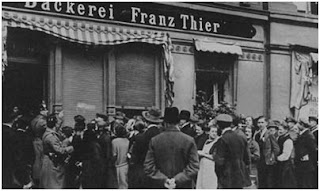When Germany was defeated by the First World War, there was no doubt that in the years to come there would be an economic crisis. When Germany was at war in 1914, the government did not want to impose heavy taxes to the people. Instead, it decided to borrow huge amounts of money, which were to be paid by the enemy after Germany had won the war. Much of the borrowing was discounted and monetized by the Reichsbank, Germany’s central bank.
By the end of the war, things did not come out as planned. There started to be inflation because of the burden of reparation payments imposed by the Treaty of Peace. The country started to issue new money, so the prices had to rise, like the case of the demand for more currency. The consumer price index had risen 140 percent. At the same time, the debt of the Reichsbank had increased from 3 billion marks to 55 billion. Germany borrowed heavily to pay its war costs, although this led also to inflation. By 1923, there seemed to be the wildest inflation in history. Often prices doubled in a few hours, and it took 200 billion marks buy a loaf of bread.
In the beginning inflation was kept within boundaries. Millions of men were still at the front, and not in the market for goods, so the necessities were limited. But the harsh reparation that Germany faced led to the mark to depreciate against foreign currencies. This meant that there was a bigger demand on a limited production capacity. Also, business accepted the inflation because they knew how to profit by speculating in foreign exchange.
The prices were rising much faster than the rate at which money was being printed. This price inflation could hardly be blamed on the government. For the next fifteen months the price index held stable. The mark actually gained in value against foreign currencies, so that prices of imported goods fell by some 50%. Here was a big opportunity to establish a stable currency. However, during these fifteen months the government kept issuing new money. The currency in circulation increased by 50% and the floating debt of the Reichsbank by 100%, providing fuel for a new outbreak.
In May 1921, price inflation started again and by July 1922 prices had risen 700%. All confidence in money vanished and the price index rose faster and faster, outpacing the printing presses which could not run out money as fast as it was depreciating.
From Mid-1922 to November 1923 hyperinflation raged in the Weimar Republic. Reichsbank officials believed that the basic trouble was the depreciation of the mark in terms of foreign currencies. In late 1922 they tried to support the mark by purchasing it in the foreign exchange markets. However, since they continued printing new currency at a fast rate, the attempt failed. They only succeeded in buying worthless marks in return for valuable gold and foreign exchange.
Under inflation, business was now operating at great speed and unemployment had disappeared. However, the real wages of workers had dropped. Businessmen began to abandon their occupations in order to speculate in stocks and in goods. By mid 1923 workers were being paid as often as three times a day, turning their money into fixed investments.
At the same time the economy was collapsing. Storekeepers could not obtain goods or could not to business fast enough to protect their cash receipts. Farms refused to bring their products to the city. Businesses started to close down and unemployment soared. Middle class people who depended on a fixed income found themselves poor. Hospitals, literary and art societies, charitable and religious institutions closed down without any funds.
Then by a mere effort of will, the government stepped in and stabilized the currency overnight. Throughout the "miracle of the Rentenmark" the depreciation halted, business revived, and inflation was ended, although there was an aftermath yet to come.
They say that this inflation contributed to Hitler’s rise to power, mainly when he talks about the negative consequences it lead. Like recently mentioned, the middle class was ruined by the inflation. They became receptive to rabid right wing propaganda and formed a fertile soil for Hitler.
Workers who had suffered through the inflation turned, in many cases, to the Communists. The biggest beneficiaries of this enormous redistribution of wealth were feudalistic industrial leaders who distrusted the democracy and who proved willing to deal with Hitler, thinking that they could control him. The democratic parties and the labor unions lost their capital and were weakened. The liberal democratic regime was discredited.
In conclusion, the government did not realize that the inflation was wiping out its burden of debt in order to ease their financial problems, which lead to greater concern for maintaining a solid currency in the monetary policy.

No hay comentarios:
Publicar un comentario